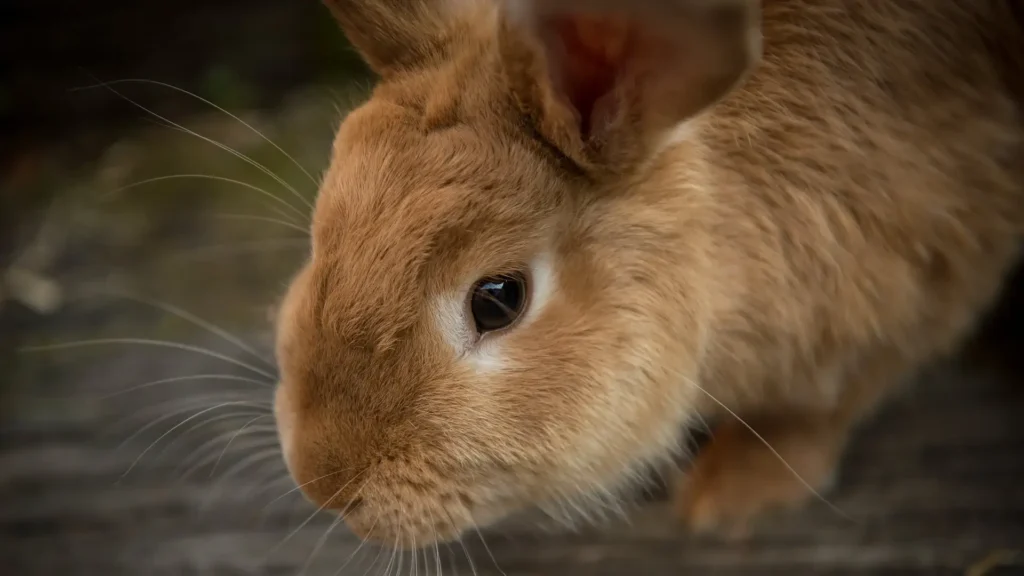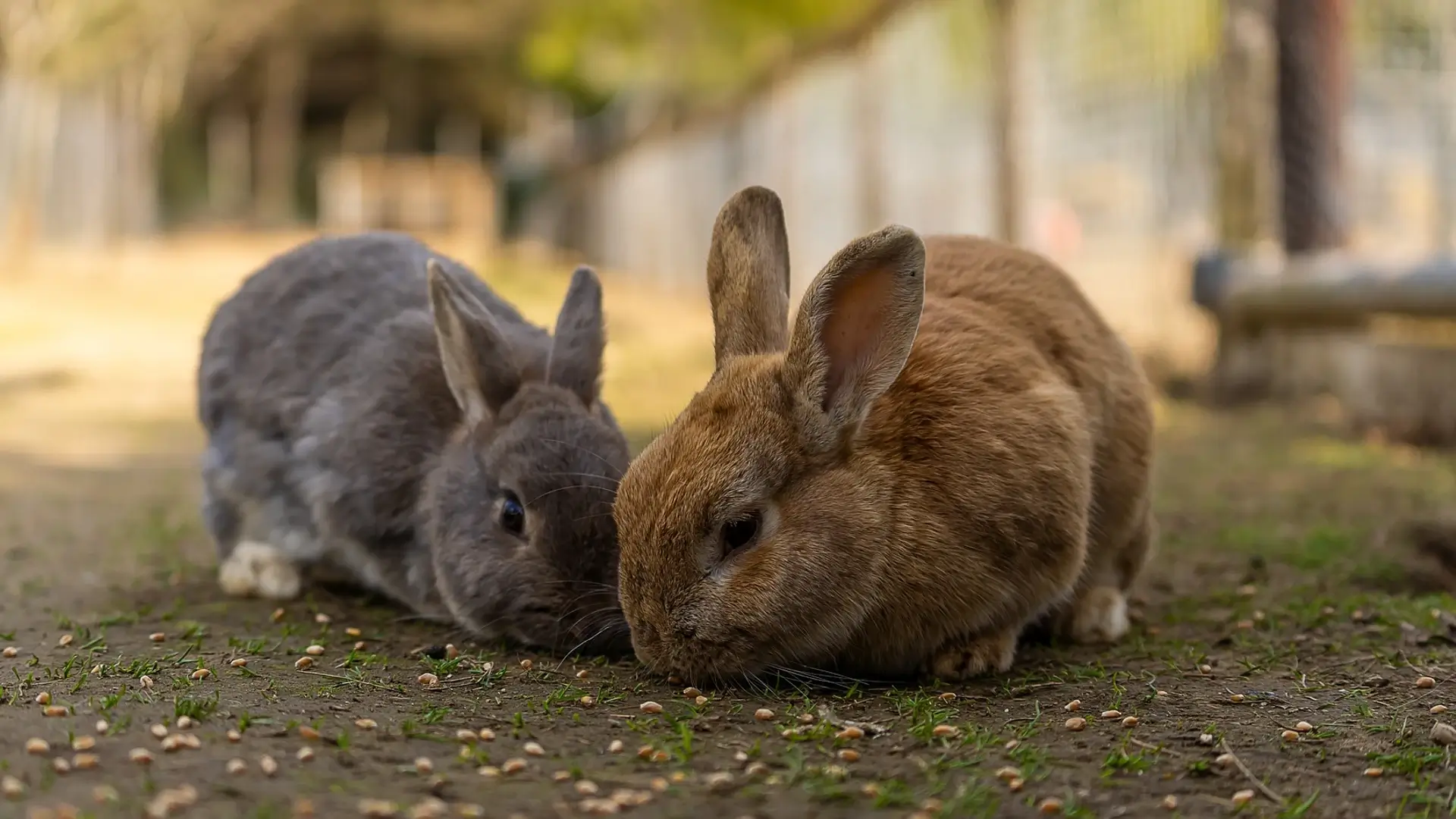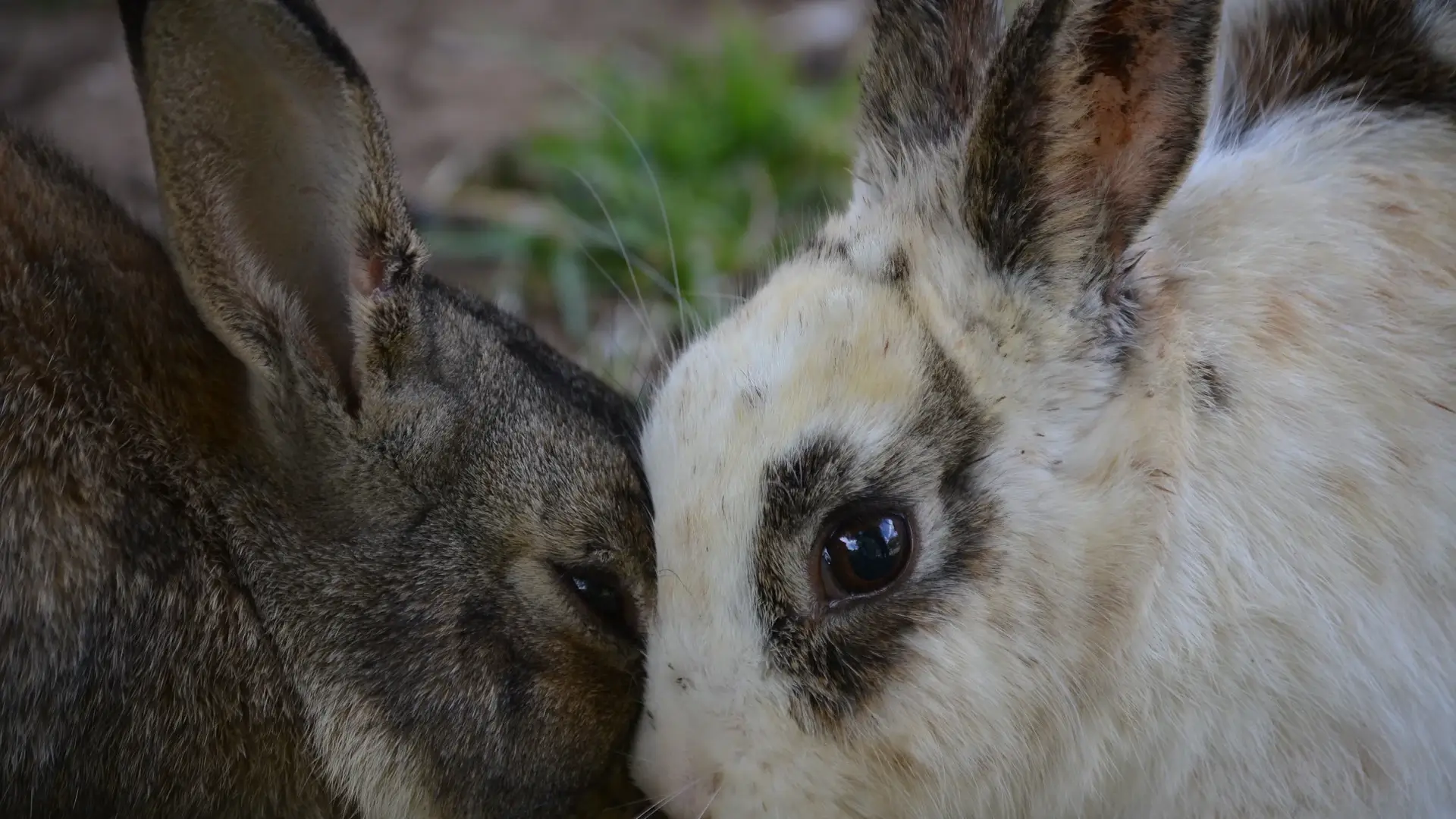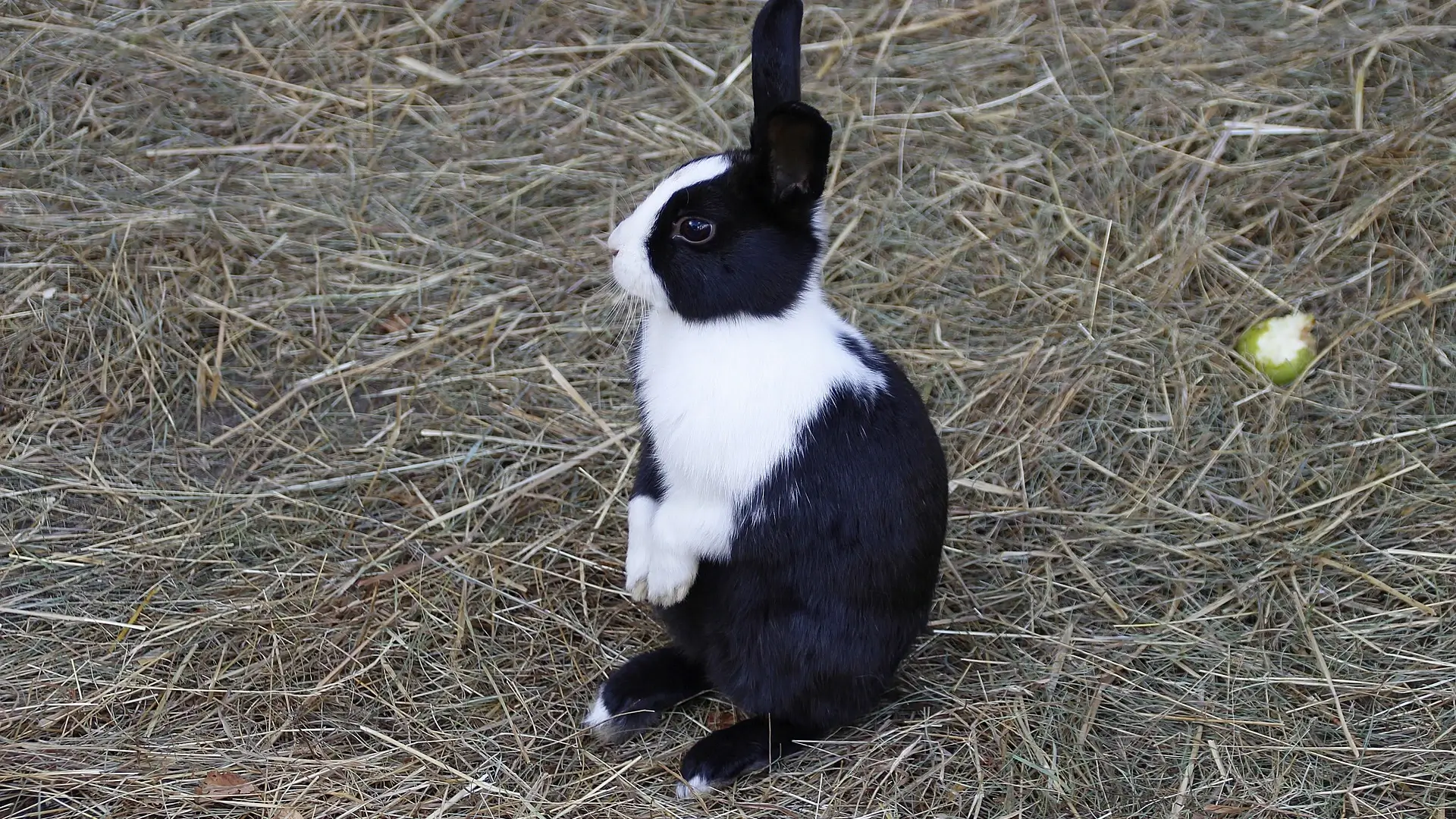One of the first things I did when I moved from the city to a homestead was to get my kids a few bunnies. They are obsessed with Bugs Bunny, and they had always wanted a rabbit. In the city, this wasn’t really viable.
We soon noticed that rabbits aren’t very vocal. They don’t make sounds like dogs, cats, or other pets. Instead, they thump (and communicate in other ways). That’s right, rabbits pound the ground with their back legs, creating a loud thumping sound. I was quite worried at first.
Why do rabbits thump? Rabbits thump as a means of communicating. Most often, a rabbit will thump in reaction to a concern. Rabbits pound the ground to warn their family in their underground warrens. They also stamp the ground to warn off a predator that is approaching. The thumping can last for a long time—until the rabbit feels safe.
There are other reasons why rabbits thump too, and most of them aren’t good. Your rabbit can thump because it is stressed, unwell, bored, or in pain. Thumping is a rabbit’s way of saying, “help, this isn’t okay.”
Like humans knock on doors to get attention, rabbits knock or thump the ground with their back feet. It’s their primary means of communication when they aren’t happy with the world. As a bunny owner, you should pay attention when your rabbit thumps.
9 Reasons Rabbits Thump
Rabbits thump at all hours of the day. Knowing why your rabbit is thumping at this point will help you decide what to do about the thumping. Rabbits thump for many different reasons:
1. Fear Causes Thumping
If your bunny has seen something that worries them or feels afraid, they will thump to express it. My children’s rabbits began thumping the first time they saw our three dogs. Even though the rabbits dove into their hutch and were quite safe, we could hear and feel them thumping away.
2. Stress Manifests in Thumping
When bunnies are stressed, they thump the ground to express this. Since rabbits are prey animals, they only know how to express their stress as fear, which is why they express their stress with the same reaction of thumping.
When my children first got the bunnies, they were really excited, and they would run-up to the hutch. This scared the bunnies, making them hide in their hutch and thump fearfully. The rabbits were afraid and stressed.
They saw my children as predators since predators (and children) are loud and fast-moving.
3. Pain Can Cause Thumping
One of the bunnies we owned got injured when another bunny fought with them. The injured bunny suffered a broken rib due to a bad kick, and they were in a lot of pain. We noticed something was wrong because the bunny huddled in one corner of the hutch, weakly thumping to show its pain.
4. Loneliness Can Incite Thumping
Finally, one of the bunnies we bought had lost her litter of kits just before she came to us, and she was lonely. She would avoid the other bunnies, and she was always in one corner of the hutch, thumping listlessly.
5. Thumping As a Warning
Rabbits will thump to scare away a predator. You may also notice your bunny thumping and acting like it doesn’t want to be picked up. Thumping is a means of communication and sometimes scares away an unwanted visitor.
6. Boredom Related Thumping
Bunnies can thump if they are bored. This is more likely when they are isolated. Rabbits are herd animals, and they do best with a friend. A solitary rabbit may thump to communicate with others or check for nearby rabbits.
Try providing more space for your rabbit to play and frisk about. Smaller spaces can cause boredom and restrict movement.
7. Illness Thumping
An illness can cause pain and general unwellness. Not all illnesses are manifest on the outside of your rabbit. Check for signs of distress or injury. If your rabbit shows other signs of illness, such as dark purple stool, lethargy, or loss of appetite, it may be ill.
8. Irritation or Aggression Thumping
Similar to thumping as a warning, rabbits may thump when they are irritated, annoyed, or feeling aggressive. This can happen if two bucks are facing off for a fight. It can also happen with does. Does are more territorial than bucks and can show aggression toward other does or buck.
If your rabbit appears to be acting irritated toward you or the rest of your family, assess if there are reasons for this. I will go into greater detail later in this article.
9. Excitement Thumping
Rabbit thumping due to excitement isn’t as common. If your rabbit is jumping, playing, and thumping as part of the play, they may be excited. Short spurts of thumping as part of play with another rabbit can occur.
The Mechanics of How Your Rabbit Thumps
Thumping is when the rabbit uses one or both of their back legs to bang at the ground with their back foot or both feet. This results in a loud banging noise that can be heard quite a distance away. It also creates a vibration through the ground that may travel to underground warrens.
A rabbit may also balance on its front feet, using both back feet to thump rhythmically. A thump can create quite a loud noise. Considering that this can be a repeated thumping for a long time, it can be annoying.
Rabbits thump until they are assured they are safe and the danger has passed. With their powerful hind legs, it may be unwise to pick up a thumping rabbit as they can easily thump on your body, which will be the equivalent of a nasty kick.
What to Do When Rabbits Thump
Knowing why your rabbit is thumping is essential to make sure you act correctly. Our instinct may be to pick up the bunny and try to comfort them, but this may only increase your rabbit’s stress and lead to more thumping. Plus, an anxious rabbit is almost guaranteed to kick you with their powerful back legs when they are stressed, and you pick them up.
Here are some ways you can help soothe your bunny when they thump repeatedly:
Rabbits Thumping at Night
If your rabbit is thumping at night, it is a sign that they feel unsafe in their hutch. Perhaps there is too much light, and they feel exposed in their hutch. They may also feel uncomfortable if you don’t provide enough hay for them to bed in.
Should you force bunnies together that aren’t properly bonded yet, they may thump as a sign of stress and as a warning to the other bunnies to stay away. Never force two new bunnies together, as this will lead to aggression and territorial display, which can include thumping.
Bunnies that thump at night may also do so when they feel uncomfortable. Perhaps their hutch doesn’t have enough ventilation, or they may feel it isn’t safe enough for them.
How to Handle Night Thumping
Get down on bunny level and really examine your bunny’s hutch and nighttime routine. Is your bunny well-fed? Have you catered to their level of comfort? Is there enough space in their hutch for all the bunnies, or is their hutch too big, making them feel afraid?
To help soothe your bunnies and make them feel peaceful, be sure to darken their hutch at night. Bunnies aren’t really nocturnal, nor are they daytime animals. Bunnies follow a crepuscular routine, which is most active at dawn and dusk.
You should ensure your bunnies have sufficient time to graze at this time of the day. If you live in a small apartment and have one or two bunnies, be sure to turn the lights on or off on a normal dawn-dusk rotation, so your bunnies’ internal clocks work appropriately.
You can also use a towel to close off part of your bunny’s cage or hutch at night if you leave lights on as your bunny needs the darkness to help with their melanin production for normal sleep cycles.
If your bunny is a solitary pet, you need to get creative. Bunnies are social creatures, and they aren’t made to sleep alone at night. Sleeping alone can make them afraid.
Being alone means isolation and death to a bunny. Partner your solitary bunny with another bunny or pet, such as a hamster or even a chicken. They will quickly snuggle together, sleeping much more comfortably.
Avoid These Actions if You Have Night Thumping
It isn’t a good idea to try and comfort or cuddle your bunny at night. This will not mean anything to your bunny, who doesn’t understand what you are trying to do.
Don’t provide extra food at night as this is not your bunny’s normal grazing time. Feeding your bunny late in the evening will not help them feel peaceful.
Rabbits Thumping During the Day
Your bunny may thump during the day when they are frightened or feel bored. A solitary bunny may be more likely to thump when they see you or if they feel alone. Since bunnies are brilliant and social creatures, they require stimulation.
Be sure to spend time with your rabbit and meet their stimulation needs.
Likewise, a rabbit may also thump during the day if they feel threatened. This could be due to sharing a hutch or enclosure with other animals or bunnies they don’t feel comfortable with. It could also be that there is too much activity around their home area.
What to Do With Daytime Thumping
If your bunny starts thumping during the day, consider what is causing it. Perhaps they are afraid of sudden noise or too much activity around their play area. If this is the case, you can move them to their hutch and use a towel to darken that area. Be sure to manage children and other farm animals to ensure your bunny has some quiet.
Perhaps your bunny is bored, and they need some stimulation. A rabbit kept in an enclosure that is too small will thump out of boredom. Your rabbit needs at least 24 square feet of play area to explore and enjoy during the day.
If your bunny is bored or feels physically cramped into a small space, giving them a larger area to explore is a great way to help them blow off boredom and stress. When our rabbits began thumping in their first enclosure, I realized the space was too small and boring for them.
We made a bunny place pen, where the rabbits could all hang out during the day. This large 40 x 40-foot play area was safely fenced in and had loads of fresh hay and some hidden fresh leafy greens that the rabbits could search for. We filled this space with a few incline hills, created a couple of hiding spots with a fallen log, and added a sandy area where the rabbits could sand-bath.
The result was that the rabbits were much happier and less stressed since they got their daily hops in. In turn, the rabbits stopped thumping so unhappily during the day. As a side-effect, the bunnies slept better at night too.
Avoid This with Daytime Thumping
With bunnies that thump during the day, it is essential not to check up on them constantly. Sure, you should keep an eye, and you need to ensure your rabbits are safe and not in any danger. But if they thump and you’ve given them enough food, space, and company, then leave them be. Rabbits don’t need constant prying eyes watching them 24/7.
If you can’t stop yourself checking up on them the whole time, try installing a baby monitor to help you remotely keep an eye. This will help you peacefully watch over your rabbit family while giving them a much-needed break from being “peopled” the whole time.
Rabbits Thumping Due to Illness
Your rabbit may thump at odd times, too, usually when they feel unwell or are not adjusting well to their environment. Rabbits are sensitive mammals, and they can easily get sick if stressed. They are also easily sick when their diet is not sufficient.
Thumping can be a pain reaction, in which case, you need to step in.
How to Check for Illness:
If you suspect your rabbit is sick and that this is the cause of their thumping, you need to examine them carefully. Appropriately hold your bunny, heart to heart, or cradled in your arms. Be sure not to pick them up like a puppy or a cat, as this can lead to spinal damage. Also, never pick your rabbit up by their ears! Check out How to Hold a Rabbit 5 Great Bunny Holds.
With your rabbit cradled in your arms, gently inspect them. Do you see any signs that your rabbit is sick? Perhaps they squirm more when you gently inspect them than usual? It may indicate a digestive issue, or your rabbit may have suffered an internal injury due to a kick from a hutch mate.
Look at the hutch, noting any signs of conflict, and look out for signs that your rabbit is not passing stool as normal. This is a bad sign if you see raspberry-colored poop in the hutch. These are cecotropes, nutrient-rich droppings that your rabbit should eat during the night or early at dawn. If your rabbit is leaving these, it may mean they are unwell.
A visit to your vet is in order, but take a care package to the vet. That’s right. If you can find any spots where your rabbit spayed or urinated and any of their droppings, be sure to take these in a clear baggie for the vet to examine. This will help your vet better determine what is wrong with your rabbit.
Don’t do This if Your Rabbit is Ill.
If you suspect your rabbit is ill and that this is the cause of their thumping, don’t assume you know what is causing their illness. You can’t give your rabbit any medicines you might give your other pets or farm animals. Rabbits have a fast metabolism, which means they can easily get sick and die from incorrect medicines or incorrect doses of medicines. pa
For a rabbit that has a repetitive issue, such as being diabetic or struggling with digestive complications, your vet might advise you on a regular course of medication to use. Never increase these doses without first consulting with your vet. Check out 14 reasons rabbits pant.
When Rabbits Thump Due to Irritation
Believe it or not, a rabbit can be quite feisty. They can easily get angry at other rabbits or other animals, and if they feel their territory is being invaded (even if that invader is you), they may thump to warn the intruder off.
If your rabbit begins thumping the minute you put them down after holding them, and they don’t show other signs of being fearful such as running away or crouching into a bundle, then they are probably annoyed with you.
Steps to Take if Your Rabbit is Irritated or Aggressive
If this is the case, you need to consider handling your rabbit. They may not enjoy how you pick them up, so check whether you are picking them up correctly.
The best way to pick up or carry your rabbit is to ease one hand under their belly, supporting their hindquarters with your wrist, resting the other hand on their back, supporting their spine. The rabbit will feel secure and not suffer any pain. I explain this to my young children. It is like picking up a football with two hands. When you’re scared, you’ll drop the football. You would ease your hand under one side, support the other side and lift it.
Your rabbit may also be semi-feral, which means they aren’t used to being handled. Be sure to take some time to bond with them. Offer yummy treats, stroke them, and find other ways to bond with them before you go in and pick them up. Thumping when you set your bunny down is probably a sign of annoyance if they feel like you picked them up without permission.
Avoid Doing This With an Irritated Rabbit
If your bunny squirms when you try to pick them up, they aren’t ready to be cradled. Revert to stroking and petting. Only force a bunny to be picked up if you need to do an emergency inspection, and be sure to hold them correctly and securely then.
Never avoid your bunny if they thump at you. Instead, remain in their general vicinity, allowing them more time to get used to you. There may be other reasons why your bunny doesn’t want you to pick it up at that time.
Perhaps your rabbit just had a big meal, and it feels bloated, so picking it up may make it uncomfortable. Your rabbit may smell something on you that makes them uncomfortable. If you have cuddled with your dog before petting your rabbit, they may smell the scent of a predator on you, which can make them feel uncomfortable and cause stress. Thumping is the rabbit’s way to tell you they don’t like you at that moment, but they may like you later.
Conclusion
Rabbit thumping isn’t something to be discouraged. It’s not bad behavior or vice that your rabbit has. Instead, it is their way of communicating, warning predators, telling you they aren’t well, or letting you know they feel stressed.
Instead of trying to stop the thumping, consider what your bunny’s thumping is telling you. I taught my children to always listen to their rabbits’ thumping and ask themselves, “What is Bugs saying today, and what do I need to do?”
Recommended Rabbit Supplies
This list contains affiliate products. Affiliate products do not cost more but helps to support BestFarmAnimals and our goal to provide farm animal owners with accurate and helpful information.
Housing: If your rabbit is indoor, you’ll need a cage, a hideout (to keep your rabbit from death by heart attack), and a space for it to get exercise and spend time with you. If you don’t want to let it run free in your house, this animal playpen provides space and keeps your rabbit from hiding under your couch.
If you keep your rabbit outdoors, an outdoor hutch that provides space and protection from predators is needed. (I’d still keep mine in a barn for further protection from the elements.)
You’ll also need bedding, toys, a grooming brush, and treats for your little friend. A litter box is important because rabbits can be potty trained. Timothy hay is the best kind of hay for rabbits as alfalfa is too sweet. Don’t forget a water drinker. I like the half-gallon waterer because it can cover two rabbits for several days. Pair it with a food bowl or a food manger (a little cleaner) and you’ll be set up!
If you want to treat your bunny to entertainment, a cat tower, a treat ball, or bunny toys all work wonderfully.
Finally, if you plan on taking your rabbit with you on trips, you’ll need a carrier. Here’s a small carrier or larger carrier that work great for occasional travel. If you travel a lot, you might want the carrier that’s rated #1 in safety for safe travels
Lastly, I use this odor eliminator for accidents and to wipe out the bottom of the cage and litter box when I clean it.




